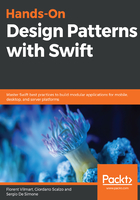
上QQ阅读APP看书,第一时间看更新
Using NS_ASSUME_NON_NULL_BEGIN and NS_ASSSUME_NON_NULL_END
We can use NS_ASSUME_NON_NULL_BEGIN and NS_ASSUME_NON_NULL_END in order to express broadly that all properties, method arguments, and return types are non-optional:
NS_ASSUME_NONNULL_BEGIN
@interface AnObject: NSObject
- (NSString *)sayHello; // return @”Hello World”
- (NSString *)append:(NSString *)aString with:(NSString *)anotherString;
@end
NS_ASSUME_NONNULL_END
The following snippet shows how to use it in Swift:
// Swift 5
let object = AnObject()
let string = object.sayHello() // String
let returnValue = object.append("First String", with: "Next String")
let otherString = string.appending(" From Swift") // safe to use
assert(otherString == "Hello World From Swift")
As you can see, nothing is an optional anymore and it properly expresses the need for non-optional parameters in Objective-C.
So far, we're able to mark large portions of code as non optional, but often, you'll need to mark just a few arguments or return types as optional.